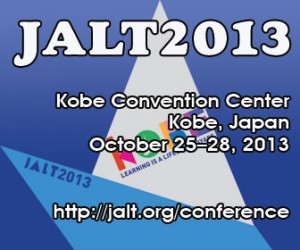5 simple tips for English classes
There are a number of really simple techniques that I tend to use in almost all my classes, so I thought it might be interesting to put some of them down here.
1. Use name signs for attendance, to learn student names, and for classroom management
I first wrote about this in 2006! Still using it now though, with the addition of the technique below that I got from my partner in crime, Daniel E. This tip is best for teachers that teach a lot of students, who basically are not able to learn names under normal circumstances.
2. Assign students class numbers to help with classroom management and paperwork
For medium-sized classes and larger, it can be really useful to assign students a class number, to be used in addition to their existing student numbers, etc. Basically give each student a number, starting from one. Have them put it on everything that they hand in (notebooks, worksheets, exam papers, etc.). You can collect them in order or just put them into order quickly after you collect them.
Then, when you come to mark them, you can work through them quickly making a note of grades in your excel sheet or markbook.
Returning the papers is also easier as they are in order. You can pass them out if students are in assigned seats, or leave them at the front in piles (easy for the students to find theirs as they are in order).
3. Dictate questions instead of giving students handouts
I used to think dictation was horribly old-fashioned, but have come to realise that the reason it’s been used for centuries is that it works 🙂
Recently I’ve been dictating questions to students instead of printing them on handouts, and dictating homework assignments. It takes a bit more time than just handing out pre-printed versions, but this way the students get to work on their listening and writing, and end up thinking about the content more.
A really easy change to make.
4. Put students in groups of 3 for group work
I used to do group work with groups of four or even (gasp!) six. The inevitable consequence of this is that some students end up doing nothing for long stretches of time. However, working in pairs means that some students can be stuck with an unskilled or unmotivated partner.
Groups of three seems to be the sweet spot, and ensures that no-one can hide from the activity, and students are less likely to be stuck with an uncooperative partner. Threes also minimize the chances of two friends bypassing the activity to continue a previous conversation!
5. Use a visible timer for activities
I have started using a countdown on my computer for short speaking activities, and find that it frees me from having to ‘guesstimate’ when to wrap things up. Also, students know how long they have to keep talking for, which makes it easier to give that one last push.
I like the online stopwatch in full-screen mode, either showing the computer screen to students or using a projector to do so for larger classes.
How about you? Do you have any good tips for other teachers?
conference extensive listening extensive reading materials online resources presentations teaching
by sendaiben
1 comment
Oxford Day 2013
I’m really pleased to be part of Oxford Day 2013, to be held in Tokyo on November 23rd.
You can see more information here.
My workshop is from 13:00 to 14:00:
Maximising input through extensive reading and listening resources (Room 2)
Teachers and learners all know that the way to get better at English is to get a lot of input (through extensive reading and listening) and practice (through speaking and writing). The hard part is actually doing that day in, day out. One important factor is whether learners can find content at their level that interests them. This 60-minute workshop will introduce a variety of resources, both online and off, suitable for all levels, as well as how to best introduce them to learners in a way that encourages and motivates.
It really is a great lineup, it’s free, and you even get a complimentary lunch 😉
Register here, and I hope to see you there.
Building habits (restarting from scratch)
“Most people overestimate what they can do in one year and underestimate what they can do in ten years.”
(Bill Gates)
As long-time readers will know, I broke my ankle in March. It still hurts from time to time, but I think it’s pretty much as recovered as it is going to get.
On Friday, I went to the gym for the first time in about nine months.
I’m going to restart the program I was using before, so did a series of exercises with an empty barbell.
It felt great.
The real challenge though is going to be doing the program consistently. It’s designed as a three-times-a-week program, but with my weekly schedule twice a week (Mondays and Fridays) is going to work better. Showing up, week in, week out, on rainy days and days when you are tired or when you are busy is really hard.
Doing things consistently is the key to success in any venture, and I am going to write about my weight training on here from time to time to keep myself accountable.
Of course, this same principle is true in saving, investing, work, writing, and pretty much any other field of endeavor. I suspect building up self-control and seeing success will transfer to other areas of my life, especially as historically I have not been great at doing things consistently (this blog is a nice exception to the rule!).
What do you want to achieve?
JALT National Conference 2013
I was lucky enough to be able to attend the JALT National conference last week, held in Kobe.
I think this was my third JALT national conference, and strangely I think it was also the one I liked the most.
I say strangely because I actually came down with a bad cold on Thursday night, and spent much of my time in Kobe feeling hungover -despite not drinking a drop for the last couple of weeks! It was probably the least social conference performance I have put on for a while, only managing to speak to a few people and skipping all the social events.
The thing about JALT national is that it is so big that there is the potential to have all sorts of different experiences, depending on what you do and which sessions you go to. In the past I have felt the average quality of presentations at the national conference was not as high as the ones at smaller, more specialized conferences (like the Pan-SIG or the ER Seminar). There are also so many things going on (well over 20 simultaneous workshops in most time slots) that paralysis through too much choice is actually a real danger 🙂
So to sum up my experience of this year’s JALT national:
The Good
- Kobe was great. An attractive, convenient, interesting city.
- The venue was great too. Easy to get to and suited to purpose.
- The keynote speeches were great this year. I saw three of them. Interesting and thought-provoking.
- The cafe at the back of the EME was pretty good, fast and tasty (good iced coffee too).
- Keith Folse was fantastic. Great speaker, and I’m really glad to have found his textbooks (we’re talking about introducing a writing course at TU). Here’s a video of his keynote in Korea in 2011.
- The sessions I went to were almost all good.
- I did manage to meet some new people and talk to some people I hadn’t spoken to for a while.
The Bad
- Having a bad cold was not fun.
- My hotel, due to lack of planning on my part, was on a different island to the venue, resulting in a 40-minute, three-train commute each morning. Oops.
- The venue, while great, consisted of three buildings and it took me until the morning of the second day to get it straight in my head. Memo to self: go in on the Friday evening and figure out the venue.
- I don’t like paying 2000 yen to rent a projector for my presentation, especially when they belong to JALT and were bought with donations from the SIGs… on top of the not cheap fee to attend the confenrence seems a bit much.
- I missed a lot of people I had been wanting to talk to.
Things I learned
- Lots of assumptions I had about bilingualism might not be true. Need to do a lot of reading.
- Xreading has incredible potential. If they are able to do half of the things they are planning to, we might end up adopting their extensive reading system.
- The Great Writing series looks incredibly interesting.
- Communicating with parents may well be the key to a successful English school. Lots to work on.
- Cambridge English might be okay as private language schools go (I have doubts sometimes) 🙂
Overall
Despite worries about the typhoon and how it would affect flights, etc. and that damn cold, this was a very smooth and enjoyable conference. I had a great audience at my workshop and ended up learning several new, pertinent things over the three days of the conference. The organizers and volunteers should all feel very satisfied and proud of themselves.
Anyone else make it to JALT National this year? What good things did I miss?


